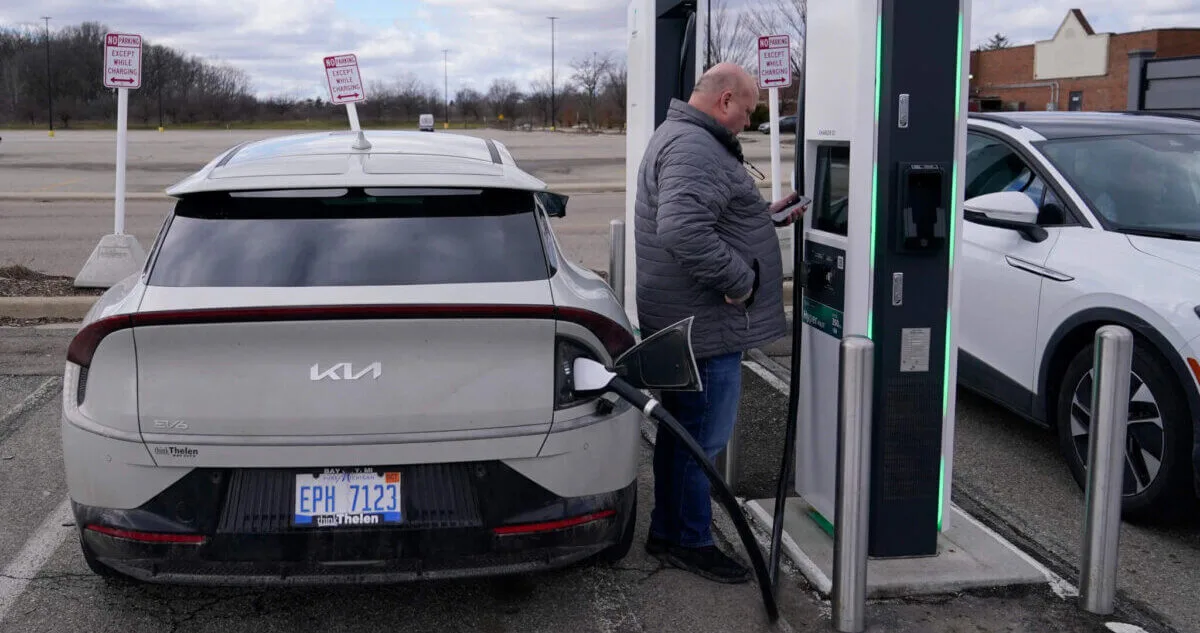
Mark Gendregske of Alger, charges his Kia EV6 in Ypsilanti. (AP Photo/Carlos Osorio)
A new federal grant program will accelerate the installation of hundreds of new electric vehicle chargers across Michigan—and ensure EV drivers can traverse both peninsulas with ease.
LANSING—Ask any electric vehicle driver in Michigan, and many will say the same thing:
We could always use a few more charging stations.
The US Department of Energy tracks thousands of publicly accessible electric vehicle chargers across the state on an interactive map. And while most electric vehicle drivers can find access to a charging station in just about every corner of the state, it’s not always a convenient fill up.
For instance: There’s not a single public charging station within about 20 miles of Mio in Oscoda County. They’re also relatively scarce near the state’s southern border, and along several routes in northern Michigan—especially between US-131 and US-127, and across much of the Upper Peninsula.
Fast-chargers—which juice up electric vehicles the fastest and are most convenient for drivers—are even further and fewer between, making some longer road trips outright impossible for drivers of certain cars that have a more limited mileage range before they run out of power.
And with Michigan seeing a surge in private investments tied to electric vehicle and battery manufacturing, state officials want to ensure the charging network is keeping up the pace.
READ MORE: Battery Plant Marks ‘Largest Business Investment’ in Mecosta County
A new grant program announced on Friday by Gov. Gretchen Whitmer aims to help get hundreds of new charging stations installed across Michigan—namely to ensure drivers making the switch to electric vehicles can traverse the state without worrying about where to juice up.
“Michigan will lead the future of mobility and electrification and today’s announcement will help us bring home federal resources to build out our statewide network,” Whitmer said.
Here’s how the new grant program works:
President Joe Biden’s Bipartisan Infrastructure Law included $110 million for the Michigan Department of Transportation to help build out the state’s charging network over the next five years—with the end goal of having 500,000 chargers installed nationwide by 2030.
READ MORE: GM Announces Partnership to Build 500 Electric Vehicle Charging Stations
About $38 million of those state-level grant funds were opened up in Michigan this week, and will be awarded to companies who can get chargers built the fastest. Up to 80% of the costs to plan, design, build and install the new electric vehicle chargers will be covered through the grant program. The companies that wind up building the chargers will cover the rest of the cost.
The state began the first steps of the bidding process for the project this week, and will accept proposals through June 6. From there, a company will be picked to get shovels in the dirt—and quickly.
Under federal rules, the new charging stations must be installed no more than 50 miles apart, and also no more than one mile from an exit along I-69, I-75, I-94, I-96, I-196, I-275, or I-696—which have been designated by the federal government as “alternative fuel corridors.”
Whitmer said the project will go a long way in supporting the Lake Michigan EV Circuit Tour Project—which set the ambitious goal of making Michigan’s shoreline into an “electric Route 66” by 2030, with enough chargers to support 2 million electric vehicles on the state’s roads.
READ MORE: Mackinac Ferry Kicks Off New Electric Future for Michigan’s Great Lakes
The new chargers will also support the state’s overarching “Healthy Climate Plan” goal to curb carbon emissions and combat climate change with statewide carbon neutrality by 2050.
State officials said the project is particularly important for the state because one in five Michigan jobs are now tied to the automotive industry—essentially meaning the future of the electric vehicle industry is likely to mirror the future of the state’s economy for decades to come.
“Building a commercially viable charging network and eliminating charging anxiety is key to Michigan future-proofing our infrastructure,” said Kathryn Snorrason, the interim chief mobility officer at the recently created Michigan Office of Future Mobility and Electrification.
READ MORE: Michigan Building Electrified Road to Power Electric Vehicles While Driving
For the latest Michigan news, follow The ‘Gander on Twitter.
Follow Political Correspondent Kyle Kaminski here.
Politics

It’s official: Your boss has to give you time off to recover from childbirth or get an abortion
Originally published by The 19th In what could be a groundbreaking shift in American workplaces, most employees across the country will now have...

Michigan Dems win special elections to regain full control of state government
LANSING—Democrats won back a majority in the Michigan House and restored their party's full control of state government Tuesday thanks to victories...

Trump says he’s pro-worker. His record says otherwise.
During his time on the campaign trail, Donald Trump has sought to refashion his record and image as being a pro-worker candidate—one that wants to...
Local News

That one time in Michigan: When we became the Wolverine State
How did Michigan become tied to an animal that's practically nonexistent there? Among the many nicknames that the state of Michigan has, arguably...

Readers’ Choice: Top 5 Bowling Spots in Michigan
From retro lanes — including one of the oldest running bowling alleys in the country — to modern entertainment centers, there's something for...






